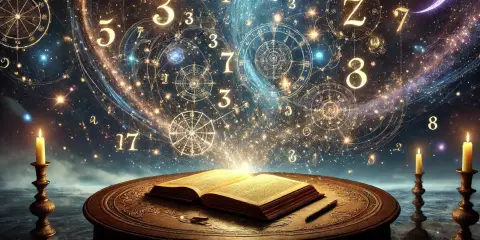
Numerology, the mystical study of numbers and their influence on human life, has fascinated scholars, philosophers, and spiritual seekers for centuries. Its origins date back thousands of years, with evidence of numerological principles found in ancient cultures across the world. From Pythagoras to modern-day thinkers, numerology continues to shape beliefs and decisions in various aspects of life.
Ancient Origins of Numerology
The roots of numerology can be traced back to several ancient civilizations. The Babylonians, known for their advanced astronomical and mathematical knowledge, were among the first to explore the connection between numbers and human destiny. The Chinese, Egyptians, and Hebrews also developed numerological systems, each attributing special significance to certain numbers in their religious and mystical traditions.
One of the most influential figures in the development of numerology was the Greek mathematician and philosopher Pythagoras (c. 570–495 BCE). He believed that numbers held profound cosmic significance and that the universe itself could be understood through numerical relationships. His teachings laid the foundation for Western numerology, which assigns numerical values to letters and interprets their meanings in relation to a person’s name and birth date.
Numerology in Different Cultures
Chaldean Numerology: Originating from ancient Babylon, this system assigns numbers to letters based on their vibrational qualities rather than sequential order.
Kabbalistic Numerology: Rooted in Jewish mysticism, this form of numerology interprets sacred texts by analyzing numerical values of Hebrew letters.
Chinese Numerology: Based on traditional beliefs, certain numbers are considered lucky or unlucky due to their phonetic similarities to words with positive or negative meanings.
Western Pythagorean Numerology: The most widely used system in the Western world, assigning numbers to letters and reducing them to single digits to derive insights into personality and destiny.
The Role of Numerology in Society
Throughout history, numerology has influenced major decisions, from choosing auspicious dates for events to guiding personal and business endeavors. Many cultures have relied on numerical interpretations to select wedding dates, launch businesses, and even construct buildings according to numerological principles.
In the Renaissance, numerology was studied alongside alchemy and astrology, with scholars believing that numbers could reveal hidden truths about the universe. Even today, many people consult numerologists for guidance in career choices, relationships, and personal growth.
Famous People Who Used Numerology
Several well-known personalities have been fascinated by numerology and incorporated it into their lives:
Leonardo da Vinci: The Renaissance genius, known for his deep interest in mathematics and proportion, applied numerological principles in his artworks. His famous "Vitruvian Man" represents the divine proportion, also known as the Golden Ratio, which aligns with numerological significance. Many believe he used numerology to enhance the symmetry and symbolism in his paintings.
Isaac Newton: The great physicist and mathematician was not only interested in mechanics and gravity but also had a deep fascination with biblical numerology. He spent years attempting to decode hidden messages in religious texts using numerical patterns, convinced that numbers held the key to divine wisdom and the end of times.
Carl Jung: The Swiss psychologist and psychiatrist explored the psychological significance of numbers and their connection to the human unconscious. He introduced the concept of synchronicity, which suggests that numerical patterns appearing in life events are meaningful coincidences, revealing deeper truths about an individual’s journey.
Nikola Tesla: The brilliant inventor and electrical engineer had an obsession with numbers, particularly 3, 6, and 9. He believed that these numbers held the secret to understanding the universe. Tesla often followed rituals based on numerology, such as walking around buildings three times before entering, and structured his inventions around numerical patterns.
Steve Jobs: The co-founder of Apple was highly attuned to aesthetics and symbolism, and it is believed that numerology played a role in his product launches. The number 7, for instance, appeared frequently in Apple's major announcements and product designs, reflecting a sense of balance and perfection in the company's innovations.
Modern-Day Relevance of Numerology
In contemporary society, numerology continues to be a source of inspiration and guidance. Many entrepreneurs, celebrities, and politicians consult numerologists before making significant life choices. Additionally, with the rise of digital technology, numerology apps and online calculators have made it more accessible than ever.
Despite skepticism from the scientific community, numerology remains deeply embedded in human culture, offering a unique perspective on the connection between numbers and life events. Whether viewed as a mystical practice or a psychological tool, its influence is undeniable.